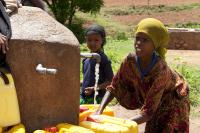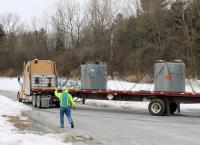-
Climate change impact on food production could cause 500,000 extra deaths in 2050
Climate change could kill more than 500,000 adults in 2050 worldwide due to changes in diets and bodyweight from reduced crop productivity. The research, published yesterday in The Lancet, is the strongest evidence yet that climate change could have damaging consequences for food production and health worldwide. The study found that by 2050, reduced fruit and vegetable intake could cause twice as many deaths as under-nutrition, and that three-quarters of all climate-related deaths due to changes in food production are estimated to occur in China and India.
-
-
Cloud-based biosurveillance ecosystem

The Departments of Defense and Homeland Security are developing a system which lets epidemiologists scan the planet for anomalies in human and animal disease prevalence, warn of coming pandemics, and protect soldiers and others worldwide.
-
-
Water storage strategies in Sub-Sahara Africa

Direct abstraction of water from rivers through ponds and pumping devices seems the most attractive water storage option in Ethiopia. However, the funding agencies that may be interested in investing in such a storage system have to consider that better access to credit, and clear abstraction policies should be ensured.
-
-
Truck carrying toxic nuclear materials stolen in Mexico

Five Mexican states have been placed on a state of alert after a truck carrying a container of dangerous radioactive material was stolen, the Mexican Interior Ministry has said. The material could cause permanent or serious injury to a person who is in contact with it for a short time, and is fatal when exposure lasts for more than a few hours.
-
-
New heat-wave formula to help health agencies prepare for extreme temperatures
Extreme heat can pose several health risks, such as dehydration, hyperthermia, and even death, especially during sustained periods of high temperatures. However, a uniform definition of a heat wave does not exist. As a result, public health agencies may be unsure of when to activate heat alerts, cooling centers and other protective measures. Researcher has developed a uniform definition of a heat wave that may help public health agencies prepare for extreme temperatures.
-
-
Chlorine-free water tastes better, and may be healthier

Chlorinated tap water is the norm around the world, but the experiences of several European countries is that it does not have to be. The benefits of foregoing chlorine include better-tasting and, potentially, healthier water.
-
-
Hackers hold hospitals’ medical data hostage
Hackers attacked several hospitals in Germany with ransomware – locking medical files and demanding ransom payment for releasing the encrypted data. The blackmailing of hospitals by encrypting their medical file has become a growing problem around the world. In California, for example, a Hollywood hospital earlier this month had to pay about $17,000 in the digital currency bitcoins to hackers in order to regain access to medical files.
-
-
“Magic wand” to improve healthcare, cybersecurity
Wireless and mobile health technologies have great potential to improve quality and access to care, reduce costs. and improve health. But these new technologies, whether in the form of software for smartphones or specialized devices to be worn, carried or applied as needed, also pose risks if they’re not designed or configured with security and privacy in mind. Researchers have developed a digital “magic wand” to improve home healthcare and to prevent hackers from stealing your personal data.
-
-
Calif. gas well blowout caused U.S. largest methane release, study finds
The Aliso Canyon natural gas well blowout released more than 100,000 tons of the powerful greenhouse gas methane before the well was finally plugged 11 February, according to the first study of the event. The results confirm that it was the largest methane leak in U.S. history.
-
-
Texas hospitals developed first rapid tests for Zika virus

Two major Texas health centers have developed Scientists at two Texas hospitals — Texas Children’s hospital and Houston Methodist hospital – have developed what they describe as the U.S. first hospital-based, rapid test for the Zika virus. The test can yield results in a matter of hour.
-
-
U.S. testing radiation therapy developed in Israel
The United States will likely begin to stock anti-radiation therapy from Pluristem Therapeutics Inc., an Israeli biotech company. The company says that the therapy can also cure nearly all people exposed to the radiation effects of nuclear weapons, “dirty” bombs, or nuclear power plants.
-
-
Virginia Tech continues addressing water crisis in Flint, Michigan

Last summer, a Flint resident reached out more than 500 miles to Virginia Tech for help, after officials said the orange water flowing into residents’ homes was OK to drink. That first round of testing was a wake-up call to the nation. Virginia Tech students and discovered more than 133 times the amount of lead on average was in the water than the maximum allowed by the U.S. Environmental Protection Agency (EPA).
-
-
Integrating markets to offset climate-related food insecurity
Global market integration is key to buffering future commodity prices and food security from the negative effects of climate change on agriculture. Rising temperatures and an increase in extreme weather events will likely have adverse impacts on global crop production, leading to higher food prices and food scarcity. But global markets that have the ability to deliver food where it is needed most could help offset these consequences.
-
-
Ebola crisis provides framework for how to respond to outbreaks like Zika virus
As world leaders grapple with containing the Zika virus, the Ebola epidemic in West Africa provides valuable lessons for how to respond to other infectious disease epidemics, according to a just-published policy report. Rebuilding local health care infrastructures, improving capacity to respond more quickly to outbreaks and considering multiple perspectives across disciplines during decision-making processes are among the key recommendations the authors propose.
-
-
Losing the fight against antibiotic resistance

Antibiotics have been used in medicine since the 1930s, saving millions of lives. Two decades later, they were introduced into agricultural practices. A growing awareness of the antibiotic resistance crisis and continued debate over who and which activities are most responsible led to the EU calling for the use of antibiotics in non-therapeutic settings to be phased out. Tackling antibiotic resistance on only one front is a waste of time because resistant genes are freely crossing environmental, agricultural and clinical boundaries, new research has shown.
-